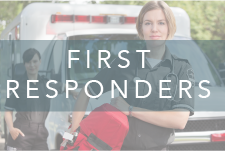Trauma’s Many Forms for First Responders
- Jul 7, 2021
- 6 min read
Updated: Aug 14, 2025

It's clear you're looking for a better understanding of how trauma affects first responders. The impact goes far beyond just major disasters and can take many forms, fundamentally altering an individual’s health and career. This is a critical topic, and I'm confident I can provide a clear and comprehensive breakdown.
What are some common forms of trauma for first responders?
First responder trauma can come from direct experiences like physical violence or using force, as well as indirect exposure such as witnessing severe injuries, hearing about abuse cases, or dealing with the aftermath of disasters.
Trauma's effects are multifaceted, impacting a first responder's mental health, decision-making, and safety in the field. To learn more about the specific symptoms and how these experiences can change their approach to routine situations, continue reading.
How does the trauma experienced by first responders differ from common associations of trauma?
“Trauma” is a term that often brings up certain images, with natural disasters, domestic or sexual violence, and physical injury all being common associations. However, First
Responder trauma’s definition is incredibly far-reaching and affects an individual in a number of ways.
Being aware of the different forms trauma can take is essential for identifying and addressing the situation before destructive or unhealthy coping strategies take hold. First responders, being on the front lines each and every day, are also at the greatest risk for exposure to various kinds of trauma that others may not be aware of.
First Responder Trauma is more than just being present at a disastrous event — it also includes helping others who have suffered through it and seeing the aftermath of the situation.
Different Forms of First Responder Trauma
Trauma can mean a wide variety of things, depending on the situation and people involved. For some, trauma can be experiencing a natural disaster or another form of mass destruction. Floods, fires, and more can all result in great loss, both in the loss of life as well as the loss of personal and sentimental belongings.
First responders often face traumatic situations that can have long-term effects on their mental health. Whether confronting someone with violent intent or being forced to use force themselves, these experiences can leave lasting emotional scars. Encounters with domestic violence and the need to intervene in volatile situations can reinforce a sense of ongoing danger.
Many agencies are now recognizing this and offering first responders trauma forms as part of their efforts to document, assess, and address the psychological impact of such events. Trauma can also arise from personal violations, such as violent or abusive relationships, unwanted sexual advances, or emotional manipulation. These experiences can deeply affect a person's sense of safety, identity, and trust in others.
It’s important to understand that trauma is not limited to those in direct danger. Medical personnel, dispatchers, and others who respond to critical incidents may experience trauma simply by being exposed to the aftermath.
Hearing about abuse cases, witnessing severe injuries, or seeing people in distress can leave just as deep a mark. In these cases, first responders trauma forms can help identify patterns of exposure and support early intervention. Recognizing the many ways trauma can manifest is the first step toward healing and support—for both those directly affected and those who step in to help.
The Effects of Trauma’s Various Forms
Regardless of whether it was experienced first-hand or vicariously through other victims, trauma fundamentally affects an individual’s health. Whether a person is suffering from flashbacks, nightmares, or having their mind filled with harrowing images from vicarious trauma, stories, and recollections, each of these traumas is very real.
All of these factors can create an incredibly difficult situation for those asked to repeatedly return to the front lines and protect others. Some other symptoms of trauma may include:
Fatigue
Impaired decision-making
Lack of concentration
Anger and frustration
Mood swings
Substance use
Invasive thoughts or images
Hypervigilance
Social avoidance
Insomnia
Irrational fear
Anxiety
Panic
Guilt
These are just some of the ways trauma can impact a person’s daily life. Those who are commonly put in traumatic situations must be aware of these signs, as well as the impact trauma may have on future events.
How Trauma Affects a First Responder in the Field
There are many different ways trauma can change how one operates in the field, whether they are responding to a routine call or the heat of a tense situation.
Experiencing trauma of any kind can reform how an individual perceives the world around them, changing how one approaches otherwise routine events. First responders who have experienced high-stakes and dangerous situations may change how they approach future situations based on these traumatic experiences.
Being involved in a gun-related situation can cause an individual to not just be wary of this potential circumstance, but they may also be expecting violence as a regular part of the job. This can ultimately cause them to perceive normal things like routine traffic stops as dangerous, violent situations.
Being prepared to defend one’s life at all times is an exhausting mental state to occupy. It both hinders a person’s ability to make decisions in the field and takes a huge toll on their mental health, as the brain is forced into a constant state of survival.
Those who have experienced trauma may also begin making riskier behaviors in the field or exercise a decreased sense of their own safety. Depression, anxiety, panic, and an altered worldview can prompt an individual to take these increased risks, putting themselves at an even greater chance for repeat exposure to trauma and complicate incredibly delicate situations.
Understanding the various forms that trauma can take is essential in taking the first step to deconstructing the flawed idea that just “getting over” trauma is possible by willpower alone. Trauma is something that needs to be addressed not just for the implications it has on an individual’s mental health, but also to help prevent a cycle of trauma from continuing to negatively impact the first responders who are regularly exposed to it.
Frequently Ask Questions:
• What are some of the effects of trauma on an individual’s health?
Trauma can lead to a variety of symptoms, including fatigue, impaired decision-making, anger, mood swings, substance use, anxiety, depression, and social avoidance.
• How can trauma affect a first responder’s behavior in the field?
Trauma can change how an individual perceives their surroundings, leading them to expect violence as a regular part of the job. It can also cause them to take increased risks and compromise their own safety.
• Is trauma only experienced by those in direct danger?
No, trauma is not limited to those in direct danger. Medical personnel, dispatchers, and others who are exposed to the aftermath of critical incidents can also experience trauma.
• What is vicarious trauma?
Vicarious trauma is a form of trauma that can occur when a person is exposed to harrowing images and stories from other victims, even if they were not directly involved in the event themselves.
• Why is it important to understand the different forms of trauma?
Understanding the various forms of trauma is essential for identifying and addressing the situation before unhealthy coping strategies take hold, and to prevent a cycle of trauma from continuing.
Understanding trauma is the first step toward healing, and at Chateau Health and Wellness Treatment Center, we're here to help you take that step. We know the challenges you face as a first responder and want to partner with you on your journey to recovery. We have a team of caring professionals dedicated to providing you with the support and tools you need to reclaim your well-being. Don't let the weight of these experiences become a burden you carry alone. Let us help. Please reach out to us at (435) 222-5225 and let us show you our commitment to your health and wellness.

About The Author
Ben Pearson, LCSW - Clinical Director
With 19 years of experience, Ben Pearson specializes in adolescent and family therapy, de-escalation, and high-risk interventions. As a former Clinical Director of an intensive outpatient program, he played a key role in clinical interventions and group therapy. With 15+ years in wilderness treatment and over a decade as a clinician, Ben has helped countless individuals and families navigate mental health and recovery challenges.
Danny Warner, CEO of Chateau Health and Wellness
Brings a wealth of experience in business operations, strategic alliances, and turnaround management, with prior leadership roles at Mediconnect Global, Klever Marketing, and WO Investing, Inc. A graduate of Brigham Young University in Economics and History, Danny has a proven track record of delivering results across diverse industries. His most transformative role, however, was as a trail walker and counselor for troubled teens at the Anasazi Foundation, where he directly impacted young lives, a personal commitment to transformation that now drives his leadership at Chateau.
Austin Pederson, Executive Director of Chateau Health and Wellness
Brings over eight years of experience revolutionizing mental health and substance abuse treatment through compassionate care and innovative business strategies. Inspired by his own recovery journey, Austin has developed impactful programs tailored to individuals facing trauma and stress while fostering comprehensive support systems that prioritize holistic wellness. His empathetic leadership extends to educating and assisting families, ensuring lasting recovery for clients and their loved ones.









